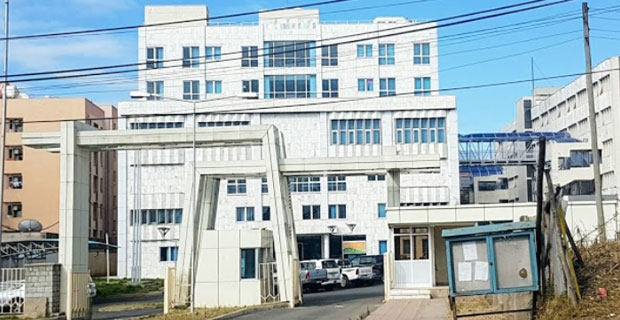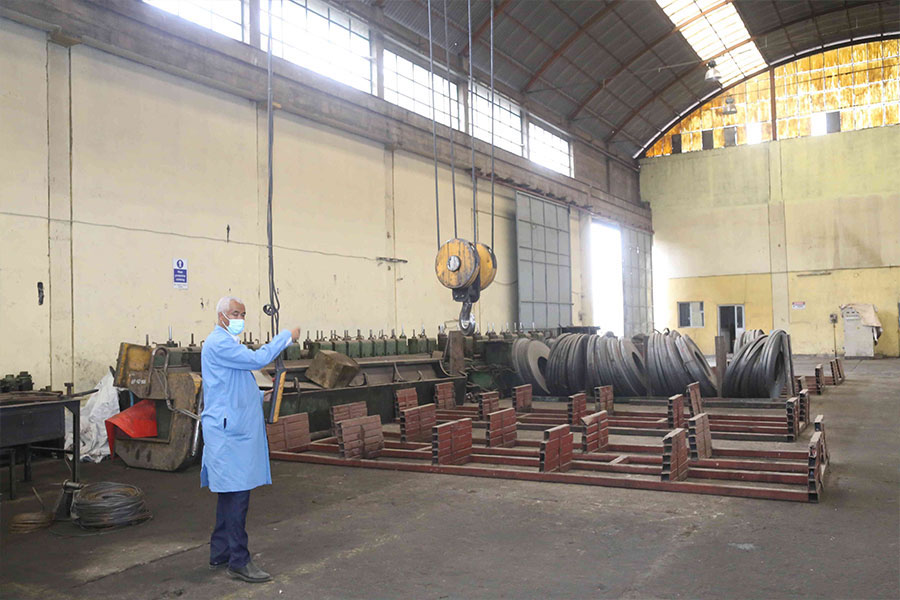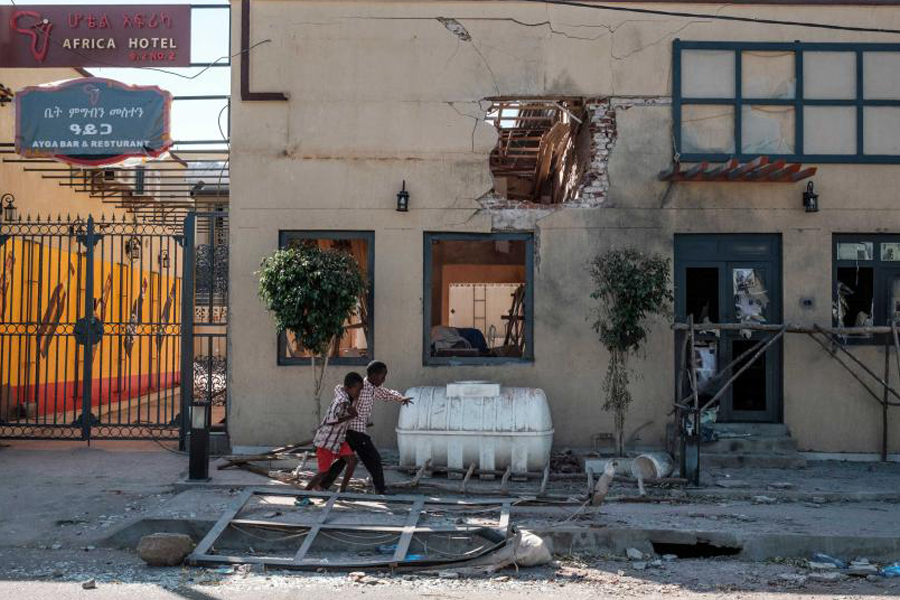
Fortune News | Sep 03,2022
The production and distribution of salt will undergo a radical overhaul following a study that revealed a poor market chain.
A bill has been drafted following the study conducted under Eyasu Simon, the senior branch coordination officer at the Ministry of Trade & Regional Integration (MoTRI). It is authored with hopes of addressing several market imperfections facing the production and distribution of salt and includes provisions for setting quality standards, inter-industry selling prices, dictating which companies receive salt inputs and restricting salt processing to regional states where the mines are located.
The draft also emphasises the accurate weighing and packaging of iodised salt when sold to consumers.
Eyasu discovered 30 million quintals of salt were mined but not available to the market at the time of his study. The problem of prices and supply shortage had nothing to do with the lack of resources but a poorly developed market chain, he told Fortune.
The study also found that most of the salt made available to the market is not adequately iodised and has unverifiable supply routes.
“We found most industrial processing plants had been buying contraband salt,” Eyasu told Fortune.
The study’s conclusions prompted the drafting of the bill. One of the primary reasons that compelled trade authorities to control the salt market is the declining yet severe iodine deficiency.
Iodine malnutrition causes disorders like mental retardation and reproductive failure; it occasionally may cause spontaneous abortions. The per capita salt demand stands around 4.5Kg with a yearly demand of half a million tonnes a year. A directive by the Council of Ministers back in 2011 made iodising edible salt mandatory. While Ethiopia has made progress, most of the population is still iodine deficient. Nearly 40pc of Ethiopian children were iodine low, a study published two years ago by Dovepress revealed.
Hagos Tiku, a lecturer and a fellow at Addis Abeba University’s chemistry department, says iodine has peculiar chemical properties. Unstable on its own, it needs to be infused into compounds like potassium iodate to remain stable.
“The price of potassium might be the significant factor contributing to its shortage in the supply chain,” he said.
Before the war between Ethiopia and Eritrea, almost all of Ethiopia’s salt supply was produced in processing plants in Eritrea along the Red Sea. The salt supply chain was restructured after the war with new processing plants built in and around the Afar Regional State. Much of it is mined from the Dinkali Depression, which is close to 1,000Km from the capital. The site is a junction for three tectonic plates.
The area, referred to by National Geography as the “cruellest place on Earth,” compensates its inhabitants with piles of this “White Gold”.
There are 17 salt processing facilities, of which 12 are operational. Washed salt from these facilities is distributed to other plants for further processing before making its way into the market. SVS Plc, a company jointly incorporated by Ethiopian and Turkish investors, built the largest salt processor with the capacity to produce close to half a million quintals of iodised salt a month. The plant opened its operations in 2019 with a paid-up capital of 14.7 million dollars.
Guts Agro Industry Plc is a food processing enterprise that was established 10 years ago by Engidu Legesse and Yosef Amare at a paid-up capital of about 15 million Br and had a recent asset valuation of close to 118 million Br. The company’s manufacturing facilities are located in the industrial zones of Bishoftu and Hawassa, about 45Km and 260Km from its headquarters in the capital.
Engidu Legesse, a manager at Guts Agro, said that prices have quadrupled over the last decade. He finds the possible ratification of this draft “laughable and highly unlikely.”
The salt industry lacks a concerned body claiming ownership, he said. Guts Agro sources unprocessed salt from Afar, usually from SVS Plc, at a price range of about six Birr for a kilogramme. Engidu was especially taken aback by an article in the bill restricting salt processing to the regional mining state.
“It would effectively put several companies out of business,” he told Fortune.
The Ethiopian Pharmaceutical & Supplies Agency (EPSA) has met Guts PLC potassium iodate needs.
Deputy Director General Solomon Nigusse confirmed that the agency supplies potassium iodate to these selected plants without payment after the Ministry of Health approves a budget.
A manager of a now obsolete company Jase Plc, Abdulkedir Abdusemed, told Fortune that the salt business is challenging to manage. “The iodine and packaging standards set by the government were difficult to meet as there are many illicit traders in the market,” he said.
The iodine requirement set by the Ethiopian Food and Drugs Administration is 20mg for a Kilogramme of table salt at the point of retail.
The company intended to process salt and export to Sudan, whose primary supply has been from Saudi Arabia since 2016.
Their plant had more than 20 employees and had imported machinery from China for processing and packaging.
According to Abdulkedir, most of the local salt available for sale rarely meets the stringent requirements imposed by the authorities, with altered weight in most local packaging.
“We couldn’t compete with the illicit market,” he said.
Kamil Mohammed runs a small kiosk around Qera; the last time he bought salt from Merkatao was a month and a half ago.
“It’s almost double the price from last year,” he told Fortune.
A quintal goes for around 1,400 Br in the hands of wholesalers; it used to cost less than 1,000 Br a year ago. The retailers welcome any move by the government that could serve to contain the price of table salt.
The communications bureau of the Ministry has confirmed that the bill is awaiting a node by the Council of Ministers before Parliamentary ratification.
PUBLISHED ON
Dec 17,2022 [ VOL
23 , NO
1181]

Fortune News | Sep 03,2022

Fortune News | Jun 17,2023

Radar | Apr 30,2022

Fortune News | Aug 31,2019

Fortune News | Aug 27,2022

Radar | Sep 26,2021

Radar | Apr 15,2023

Radar | Nov 27,2018

Verbatim | Sep 23,2023

Fortune News | Jul 28,2024

Dec 22 , 2024 . By TIZITA SHEWAFERAW
Charged with transforming colossal state-owned enterprises into modern and competitiv...

Aug 18 , 2024 . By AKSAH ITALO
Although predictable Yonas Zerihun's job in the ride-hailing service is not immune to...

Jul 28 , 2024 . By TIZITA SHEWAFERAW
Unhabitual, perhaps too many, Samuel Gebreyohannes, 38, used to occasionally enjoy a couple of beers at breakfast. However, he recently swit...

Jul 13 , 2024 . By AKSAH ITALO
Investors who rely on tractors, trucks, and field vehicles for commuting, transporting commodities, and f...

Oct 25 , 2025
The regulatory machinery is on overdrive. In only two years, no fewer than 35 new pro...

Oct 18 , 2025
The political establishment, notably the ruling party and its top brass, has become p...

Oct 11 , 2025
Ladislas Farago, a roving Associated Press (AP) correspondent, arrived in Ethiopia in...

Oct 4 , 2025
Eyob Tekalegn (PhD) had been in the Governor's chair for only weeks when, on Septembe...